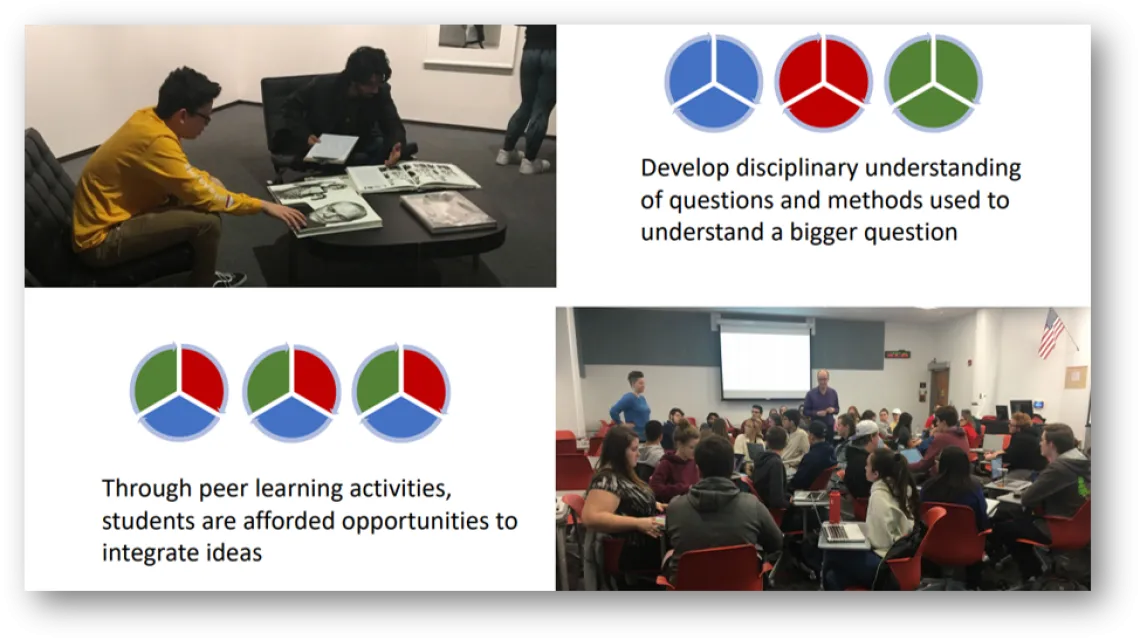UA Cross Fertilizing Academic Disciplines

Three professors – a scientist, a sociologist and a humanist – walk into the same classroom…
That may sound like the start of a joke, but it isn’t. It is exactly what is happening in a new general education course being test-driven at the University of Arizona.
The project is part of the university-wide CUES (Center for University Education Scholarship) project in the honors college that will inform the UA Strategic Initiative 1.2A Design a new Gen Ed curriculum. Three professors – one each from the sciences, the social sciences and the humanities – are cooperatively teaching a diverse group of mainly freshmen students who, like their professors, come from across the intellectual spectrum.
The professors lead their students separately through the course, but, every third or fourth lecture, all of the sections meet together. The students separate into small, mixed-discipline groups, with at least one student but no more than two from each discipline.
The students then tackle the same question, which centers on the theme “being human in the 21st Century.” The students search for answers by bridging traditional intellectual divides – seeking commonalities or perhaps identifying significant differences.
Associate Professor of Practice John Pollard, one of six CUES Fellows on campus, says the entry-level course is not only about expanding young minds, but also about trying to advance the growth of new ideas in curriculum. Pollard, assistant dean of academic affairs in the UA Honors College, says he and his colleagues are using this course to investigate new “ways of assessment, ways to improve student learning and ways to improve retention, and to develop research around it.”
Pollard, who completed his doctorate in organic chemistry at the UA, says universities all across the country are looking at new directions in teaching. “We are piloting what could become a model for future general education courses on campus,” he said.
James Linskey is a UA freshman working on a double major in physiology and Spanish. His long-term hope is to get into medical school. Linskey admits that when he started the mixed-discipline course, he was skeptical about the non-traditional approach. But now, he embraces it.
“Sometimes we have conflicts, but then we have those moments when you see the other side. It’s pushing us to develop skills with a different mindset.”
Jennie McStotts, an assistant professor in the Honors College, brings a diverse educational background to the course as the humanities representative. Along with a master's in fine arts, she also holds a law degree. She has been an attorney, an editor of creative and academic journals, and a finalist in the prestigious Rumi Prize for Poetry.
McStotts thinks getting students involved in a course offering diverse perspectives early in their academic career is extremely important. She believes it is the time in their intellectual life when this approach can be the most influential.
And the students are certainly asked to take on some big intellectual challenges.
Professor McStotts points to a typical exercise in which the students from all three parts of the program join in a discussion referencing surgical implants. Implants which might include knees, hips and more. The fascinating question that emerged was, “how many modifications can you make to a human being before they are no longer human?” Initially a scientist might make a judgment relying on the measurable percentage of machine versus the percentage of muscle and mind. A humanist may seek answers in what unmeasurable qualities of compassion and creativity remain.
Ultimately, the class will be undertaking a group project where they will be asked to integrate their perspectives. McStotts hopes that these types of challenging experiments in a cross-disciplinary environment will result in a model other educators can adopt.
Frannie Slater is a pre-business student. She says she has embraced the cross-disciplinary approach and is prepared to continue it throughout her education. Most of the time she says, she is not conscious of being part of a new approach to education. The only time it even crosses her mind is when the joint meetings of all students are videotaped. That is a reminder she says, that the course is new and being closely studied.
One of Pollard's graduate students, Megan Baker, is studying toward a doctorate in higher education. Baker is helping pioneer the program by carrying out educational research on course design and the implementation process, hence the videotaping of some classes..
Baker says the professors are modeling their own disciplinary expertise in individual classes, “but during the co-convened session they are promoting cross-disciplinary dialogue in exploring an issue.”
Pollard says he is pleased the way things have gone.
“Building integrated perspective-taking is something I value in this course," Pollard says. "How can we build general education courses that enable us to come up with more holistic ideas and solutions in problem solving?”
Eventually, Pollard would like to see a fully integrated general education experience for all UA students. He believes it would distinguish graduates of the UA by giving them broad and powerful perspectives.
“The kind of people our society needs, for tomorrow.”
- 30 -
